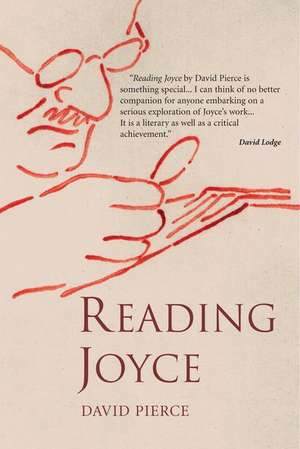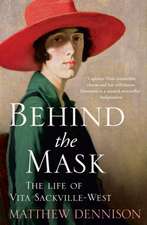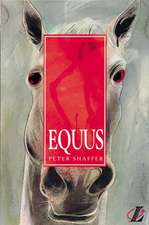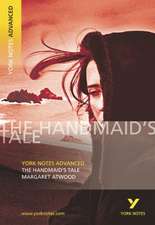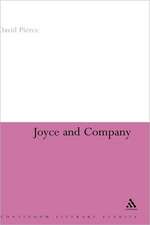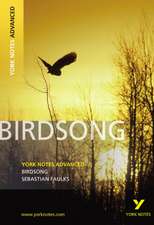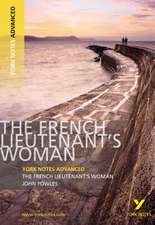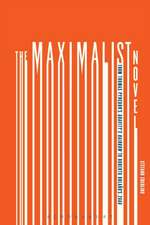Reading Joyce: Reading Literature
Autor David Pierceen Limba Engleză Hardback – 11 mai 2016
So wrote James Joyce towards the end of his final work, Finnegans Wake. The question continues to be asked about the author who claimed that he had put so many enigmas into Ulysses that it would `keep the professors busy for centuries' arguing over what he meant. For Joyce this was a way of ensuring his immortality, but it could also be claimed that the professors have served to distance Joyce from his audience, turning his writings into museum pieces, pored over and admired, but rarely touched. In this remarkable book, steeped in the learning gained from a lifetime's reading, David Pierce blends word, life and image to bring the works of one of the great modern writers within the reach of every reader. With a sharp eye for detail and an evident delight in the cadences of Joyce's work, Pierce proves a perfect companion, always careful and courteous, pausing to point out what might otherwise be missed. Like the best of critics, his suggestive readings constantly encourage the reader back to Joyce's own words.
Beginning with Dubliners and closing with Finnegans Wake, Reading Joyce is full of insights that are original and illuminating, and Pierce succeeds in presenting Joyce as an author both more straightforward and infinitely more complex than we had perhaps imagined. T. S. Eliot wrote of Joyce's masterpiece, Ulysses, that it is `a book to which we are all indebted, and from which none of us can escape'. With David Pierce as a guide, the debt we owe to Joyce becomes clearer, and the need to flee is greatly reduced.
| Toate formatele și edițiile | Preț | Express |
|---|---|---|
| Paperback (1) | 360.31 lei 6-8 săpt. | |
| Taylor & Francis – 5 dec 2007 | 360.31 lei 6-8 săpt. | |
| Hardback (1) | 1000.27 lei 6-8 săpt. | |
| Taylor & Francis – 11 mai 2016 | 1000.27 lei 6-8 săpt. |
Preț: 1000.27 lei
Preț vechi: 1219.84 lei
-18% Nou
Puncte Express: 1500
Preț estimativ în valută:
191.40€ • 199.84$ • 158.41£
191.40€ • 199.84$ • 158.41£
Carte tipărită la comandă
Livrare economică 04-18 aprilie
Preluare comenzi: 021 569.72.76
Specificații
ISBN-13: 9781138146563
ISBN-10: 1138146560
Pagini: 384
Dimensiuni: 156 x 234 x 22 mm
Greutate: 0.45 kg
Ediția:1
Editura: Taylor & Francis
Colecția Routledge
Seria Reading Literature
Locul publicării:Oxford, United Kingdom
ISBN-10: 1138146560
Pagini: 384
Dimensiuni: 156 x 234 x 22 mm
Greutate: 0.45 kg
Ediția:1
Editura: Taylor & Francis
Colecția Routledge
Seria Reading Literature
Locul publicării:Oxford, United Kingdom
Cuprins
1. Introduction 2. 1904: Joyce’s Point of Departure 3. The Unfinished Sentences of ‘The Sisters’ 4. Saying Goodbye in ‘Eveline’ 5. Blinds and Railings in ‘Araby’ and ‘Two Gallants’ 6. Teaching Dubliners 7. On A Portrait of the Artist as a Young Man 8. Approaching Ulysses 9. Leopold Bloom At Home and At Work 10. Student Responses to Molly Bloom 11. Figuring Out Finnegans Wake
Recenzii
"I fully agree with what David Lodge writes in the blurb text, "I can think of no better companion for anyone embarking on a serious exploration of Joyce's work, but seasoned Joyceans will also find much to delight and inform them here." The book is, in fact, a literary as well as a critical achievement. In face of the mass of over-researched interpretations and provective speculations that have been dominating Joyce criticism for quite a time, reading Reading Joyce is a relief. It is one of the most absorbing dissertations in Joyce I have ever come across. It deserves a place on the shelf of exciting and exceptional Joyceana. It is entertaining in an extraordinary manner. The "unique blend of commentary and confession" (Lodge) clearly surpasses the dry academic discourses, which in fact no longer properly illuminate in a satisfying way what Joyce wrote and thought. Pierce has added to his text a plethora of photographs, maps, drawings etc., which go with highly original, illuminating, commentaries. Just buy and read it!"
Wolfgang Wicht, author of Utopianism in James Joyce’s Ulysses and James Joyce and Company
"Joyce is a remarkable book which not only manages to bring fresh angles and knowledge to Joyce studies, but also finds a new way of writing about the Irish author. By revisiting aspects of Dubliners, A Portrait of the Artist as a Young Man, Exiles, Ulysses, and Finnegans Wake which have become more familiar by now, Pierce succeeds in subtly theorizing how we should approach Joyce. In an almost Proustian aphorism - 'Texts read us as much as we read them' - Pierce exemplifies his own way of engaging theoretically with Joyce.This (re)mapping of Joyce's territory makes familiar the unfamiliar, identifying reading strategies which seem to put us in tune with Joyce's own writing strategies, based on establishing a new 'covenant' between the word and the world."
Hugues Azarad, Modern Language Review 104:4 October 2009
"Sweeping away years of confusing and contradictory scholarly debate, Pierce brings Joyce's writing - and his characters - back to life. For anyone intending a serious study of Joyce's writing, Reading Joyce is more than just useful; it's essential."
Yorkshire Evening Post
"Pierce contributes richly out of his 40-year legacy in writing and teaching Joyce [and] succeeds in providing novice Joyce readers with a work that charms, enhances, and motivates."
Choice Reviews (USA)
"Reading Joyce is absolutely the best kind of introductory book: not a dumbed-down crib, but an informed and passionate guide that both beginners and experts will learn from. And reading Pierce it becomes very clear why we should become students of Joyce: yes, he's difficult, but not unreadably so; yes, it takes a bit of work, but he is an addictive pleasure once you put a bit of effort in; yes, there is crazy Modernist stylistics, but, at heart, Joyce is a wonderful storyteller. At the end of Finnegans Wake Joyce famously asked "Is there one who understands me?" David Pierce can boldly step forward, and those who read this wonderful book can themselves tentatively raise a hand."
Mark Thwaite, Ready Steady Book
"ReadingJoyce is an ideal introduction to the works of the Master. Unlike many writers on Joyce, Pierce addresses the reader on terms of equality. He tries to rescue Joyce from his reputation as a difficult writer rather than to revel self-regardingly in difficulties and complicate them with a theoretical overlay which Joyce himself would have laughed at. Pierce does not flagellate himself, as too many Joyceans do, over trifles or theories and does not expect his readers to do so either."
Mr. Justice Adrian Hardiman, Supreme Court of Ireland, Joycean Scholar
"Many critics of James Joyce are smart: David Pierce is also wise. Reading Joyce brilliantly and judiciously uses his experiences as a fine teacher, a major scholar and an open, receptive reader. And few critics are so skillfully alert to the actual, material, visible world in which Joyce's works take place."
Morris Beja, author of James Joyce: A Literary Life, and past President, the International James Joyce Foundation
"This is a brave, richly informed, and candid book, an engaging mix of biography, auto-biography, and critical analysis. A godsend to teachers and students alike, it brilliantly demystifies Joyce, without compromising his complexity. It is a uniquely personal odyssey of discovery which all Joyceans will recognise as their own, too."
Professor Terry Dolan, University College Dublin
"Anyone engaged with teaching or discussing Joyce will find this a refreshing and illuminating book, open to new ideas, which will prove stimulating to their own further explorations with or without students. It is to be warmly recommended all round."
Peter Costello, Studies, Winter 2008
"Despite the seemingly straightforward tone of the book's title, Reading Joyce stands as a highly challenging invitation to engage the very sophisticatedperspectives of aveteran teacher andlong time Joycescholar....Pierce confidently moves from one topic to another fully expecting his readers to follow. And, in offering us the benefit of a range of perspectives that he brings to Joyce's major works, Pierce pays us the compliment of believing us capable of discerning connections and tracing analytic logic without, at times, having the benefit of elaboration. In consequence, Reading Joyceemergesnot as an introduction to the canon and certainly not as a crib for beginners seeking to come to a fundamental sense of Joyce's writing.
Instead, we find ourselves confronted with a deep-thinking reader of strong opinions and fixed points of view. He is generous in sharing them with us, but Pierce does not feel the need to persuade or cajole our assent. Indeed, he leaves these points for us to engage or not as we choose....With its autobiographical moments and esoteric connections, Pierce's book outlines the posture of a mature scholar, confident in his assessments and open to sharing his views with whoever wishes to engage them."
Michael Patrick Gillespie, James Joyce Literary Supplement, Fall 2008
"Reading Joyce is a personal account of the problems and pleasures of encountering Joyce written by a distinguished Irish literature scholar explicitly in hopes of finding and guiding new readers to Joyce. His comments on A Portrait are particularly enlightening, and his heroic unearthing of Sussex Earwickers abundantly fascinating. As a Joycean pictorial miscellany this book has few equals, and the treasures Pierce has unearthed will be of inestimable interest to thoughtful scholars, teachers, and students."
Adrian Paterson, Irish Studies Review 17:2 May 2009
"His handling of the material background of 'Aeolus,' Ulysses' newspaper chapter, is deeply informed, a high point of his book. Although he spends relatively little time on the text of Finnegans Wake, his archaelogical-genealogical explorations into the name Joyce gave its main character are consistently illuminating. As usual, the photographs help a lot.... Reading Joyce is a book unlike others.... It is always personable, sometimes enchanting, frequently informative, occasionally frustrating, at times seeming to transcend the genre and at times seeming to make rather a hash of it. All in all, David Pierce can be proud of having written it. And if I don't quite know which shelf in my library of Joyce-related books I should put it on - well, that's not really his problem".
John Gordon, English Literature in Transition, 1880-1920 Volume 52, Number 3, 2009.
"Reading Joyce is not merely an analysis of the author and his works but of how one devotee came to discover and be overwhelmed by his discovery. This book is therefore both autobiographical and analytical, an attempt to 'rescue Joyce from his reputation as a difficult writer'. It mixes biography with criticism: Joyce the man and Joyce the writer and throughout the author shares his enthusiasm with his readers. Joyce 'learnt how to transform the world into language and himself... into memory. An enigma to the end'. If he remains an enigmatic reader, the boundaries of that enigma will be better understood after reading this personal and enlightening study".
P.P.F., Contemporary Review Spring 2009
"It is a rich, detailed and informative study that takes the reader on an extraordinary voyage through Joyce's major texts from Dubliners to Finnegans Wake. What is wonderful about Reading Joyce is that Pierce never takes anything for granted or rushes on but stresses the importance of 'delay' and of paying attention to details and particulars when analysing Joyce's texts. How such deferred readings can work is then shown invely reflects on the 'odd' title of Joyce's first published novel and in his wonderfully detailed and perceptive analysis of 'The Dead'. And it is, above all, this passion for Joyce and Joyce's texts that makes reading Pierce reading Joyce such a pleasant adventure."
Vike Martina Plock, James Joyce, Broadsheet (80) June 2008
"Reading Joyce is refreshing for the experienced Joycean, refining important concepts and approaches. For new readers, it is a tonic, welcoming them into the occasionally arcane world of Joyce studies with secure footing and guideposts. It makes an encounter with this Odyssean author understandable. But Reading Joyce is more than an introduction; it is a companion to take through the black holes of the Joycean universe with instructive pauses and helpful signposts."
Ira B. Nadel, James Joyce Quarterly 46:2, 2009
Wolfgang Wicht, author of Utopianism in James Joyce’s Ulysses and James Joyce and Company
"Joyce is a remarkable book which not only manages to bring fresh angles and knowledge to Joyce studies, but also finds a new way of writing about the Irish author. By revisiting aspects of Dubliners, A Portrait of the Artist as a Young Man, Exiles, Ulysses, and Finnegans Wake which have become more familiar by now, Pierce succeeds in subtly theorizing how we should approach Joyce. In an almost Proustian aphorism - 'Texts read us as much as we read them' - Pierce exemplifies his own way of engaging theoretically with Joyce.This (re)mapping of Joyce's territory makes familiar the unfamiliar, identifying reading strategies which seem to put us in tune with Joyce's own writing strategies, based on establishing a new 'covenant' between the word and the world."
Hugues Azarad, Modern Language Review 104:4 October 2009
"Sweeping away years of confusing and contradictory scholarly debate, Pierce brings Joyce's writing - and his characters - back to life. For anyone intending a serious study of Joyce's writing, Reading Joyce is more than just useful; it's essential."
Yorkshire Evening Post
"Pierce contributes richly out of his 40-year legacy in writing and teaching Joyce [and] succeeds in providing novice Joyce readers with a work that charms, enhances, and motivates."
Choice Reviews (USA)
"Reading Joyce is absolutely the best kind of introductory book: not a dumbed-down crib, but an informed and passionate guide that both beginners and experts will learn from. And reading Pierce it becomes very clear why we should become students of Joyce: yes, he's difficult, but not unreadably so; yes, it takes a bit of work, but he is an addictive pleasure once you put a bit of effort in; yes, there is crazy Modernist stylistics, but, at heart, Joyce is a wonderful storyteller. At the end of Finnegans Wake Joyce famously asked "Is there one who understands me?" David Pierce can boldly step forward, and those who read this wonderful book can themselves tentatively raise a hand."
Mark Thwaite, Ready Steady Book
"ReadingJoyce is an ideal introduction to the works of the Master. Unlike many writers on Joyce, Pierce addresses the reader on terms of equality. He tries to rescue Joyce from his reputation as a difficult writer rather than to revel self-regardingly in difficulties and complicate them with a theoretical overlay which Joyce himself would have laughed at. Pierce does not flagellate himself, as too many Joyceans do, over trifles or theories and does not expect his readers to do so either."
Mr. Justice Adrian Hardiman, Supreme Court of Ireland, Joycean Scholar
"Many critics of James Joyce are smart: David Pierce is also wise. Reading Joyce brilliantly and judiciously uses his experiences as a fine teacher, a major scholar and an open, receptive reader. And few critics are so skillfully alert to the actual, material, visible world in which Joyce's works take place."
Morris Beja, author of James Joyce: A Literary Life, and past President, the International James Joyce Foundation
"This is a brave, richly informed, and candid book, an engaging mix of biography, auto-biography, and critical analysis. A godsend to teachers and students alike, it brilliantly demystifies Joyce, without compromising his complexity. It is a uniquely personal odyssey of discovery which all Joyceans will recognise as their own, too."
Professor Terry Dolan, University College Dublin
"Anyone engaged with teaching or discussing Joyce will find this a refreshing and illuminating book, open to new ideas, which will prove stimulating to their own further explorations with or without students. It is to be warmly recommended all round."
Peter Costello, Studies, Winter 2008
"Despite the seemingly straightforward tone of the book's title, Reading Joyce stands as a highly challenging invitation to engage the very sophisticatedperspectives of aveteran teacher andlong time Joycescholar....Pierce confidently moves from one topic to another fully expecting his readers to follow. And, in offering us the benefit of a range of perspectives that he brings to Joyce's major works, Pierce pays us the compliment of believing us capable of discerning connections and tracing analytic logic without, at times, having the benefit of elaboration. In consequence, Reading Joyceemergesnot as an introduction to the canon and certainly not as a crib for beginners seeking to come to a fundamental sense of Joyce's writing.
Instead, we find ourselves confronted with a deep-thinking reader of strong opinions and fixed points of view. He is generous in sharing them with us, but Pierce does not feel the need to persuade or cajole our assent. Indeed, he leaves these points for us to engage or not as we choose....With its autobiographical moments and esoteric connections, Pierce's book outlines the posture of a mature scholar, confident in his assessments and open to sharing his views with whoever wishes to engage them."
Michael Patrick Gillespie, James Joyce Literary Supplement, Fall 2008
"Reading Joyce is a personal account of the problems and pleasures of encountering Joyce written by a distinguished Irish literature scholar explicitly in hopes of finding and guiding new readers to Joyce. His comments on A Portrait are particularly enlightening, and his heroic unearthing of Sussex Earwickers abundantly fascinating. As a Joycean pictorial miscellany this book has few equals, and the treasures Pierce has unearthed will be of inestimable interest to thoughtful scholars, teachers, and students."
Adrian Paterson, Irish Studies Review 17:2 May 2009
"His handling of the material background of 'Aeolus,' Ulysses' newspaper chapter, is deeply informed, a high point of his book. Although he spends relatively little time on the text of Finnegans Wake, his archaelogical-genealogical explorations into the name Joyce gave its main character are consistently illuminating. As usual, the photographs help a lot.... Reading Joyce is a book unlike others.... It is always personable, sometimes enchanting, frequently informative, occasionally frustrating, at times seeming to transcend the genre and at times seeming to make rather a hash of it. All in all, David Pierce can be proud of having written it. And if I don't quite know which shelf in my library of Joyce-related books I should put it on - well, that's not really his problem".
John Gordon, English Literature in Transition, 1880-1920 Volume 52, Number 3, 2009.
"Reading Joyce is not merely an analysis of the author and his works but of how one devotee came to discover and be overwhelmed by his discovery. This book is therefore both autobiographical and analytical, an attempt to 'rescue Joyce from his reputation as a difficult writer'. It mixes biography with criticism: Joyce the man and Joyce the writer and throughout the author shares his enthusiasm with his readers. Joyce 'learnt how to transform the world into language and himself... into memory. An enigma to the end'. If he remains an enigmatic reader, the boundaries of that enigma will be better understood after reading this personal and enlightening study".
P.P.F., Contemporary Review Spring 2009
"It is a rich, detailed and informative study that takes the reader on an extraordinary voyage through Joyce's major texts from Dubliners to Finnegans Wake. What is wonderful about Reading Joyce is that Pierce never takes anything for granted or rushes on but stresses the importance of 'delay' and of paying attention to details and particulars when analysing Joyce's texts. How such deferred readings can work is then shown invely reflects on the 'odd' title of Joyce's first published novel and in his wonderfully detailed and perceptive analysis of 'The Dead'. And it is, above all, this passion for Joyce and Joyce's texts that makes reading Pierce reading Joyce such a pleasant adventure."
Vike Martina Plock, James Joyce, Broadsheet (80) June 2008
"Reading Joyce is refreshing for the experienced Joycean, refining important concepts and approaches. For new readers, it is a tonic, welcoming them into the occasionally arcane world of Joyce studies with secure footing and guideposts. It makes an encounter with this Odyssean author understandable. But Reading Joyce is more than an introduction; it is a companion to take through the black holes of the Joycean universe with instructive pauses and helpful signposts."
Ira B. Nadel, James Joyce Quarterly 46:2, 2009
Descriere
`Is there one who understands me?' So wrote James Joyce towards the end of his final work, Finnegans Wake. The question continues to be asked about the author who claimed that he had put so many enigmas into Ulysses that it would `keep the professors busy for centuries' arguing over what he meant. For Joyce this was a way of ensuring his immortality, but it could also be claimed that the professors have served to distance Joyce from his audience, turning his writings into museum pieces, pored over and admired, but rarely touched. In this remarkable book, steeped in the learning gained from a lifetime's reading, David Pierce blends word, life and image to bring the works of one of the great modern writers within the reach of every reader. With a sharp eye for detail and an evident delight in the cadences of Joyce's work, Pierce proves a perfect companion, always careful and courteous, pausing to point out what might otherwise be missed. Like the best of critics, his suggestive readings constantly encourage the reader back to Joyce's own words.
Beginning with Dubliners and closing with Finnegans Wake, Reading Joyce is full of insights that are original and illuminating, and Pierce succeeds in presenting Joyce as an author both more straightforward and infinitely more complex than we had perhaps imagined. T. S. Eliot wrote of Joyce's masterpiece, Ulysses, that it is `a book to which we are all indebted, and from which none of us can escape'. With David Pierce as a guide, the debt we owe to Joyce becomes clearer, and the need to flee is greatly reduced.
Beginning with Dubliners and closing with Finnegans Wake, Reading Joyce is full of insights that are original and illuminating, and Pierce succeeds in presenting Joyce as an author both more straightforward and infinitely more complex than we had perhaps imagined. T. S. Eliot wrote of Joyce's masterpiece, Ulysses, that it is `a book to which we are all indebted, and from which none of us can escape'. With David Pierce as a guide, the debt we owe to Joyce becomes clearer, and the need to flee is greatly reduced.
